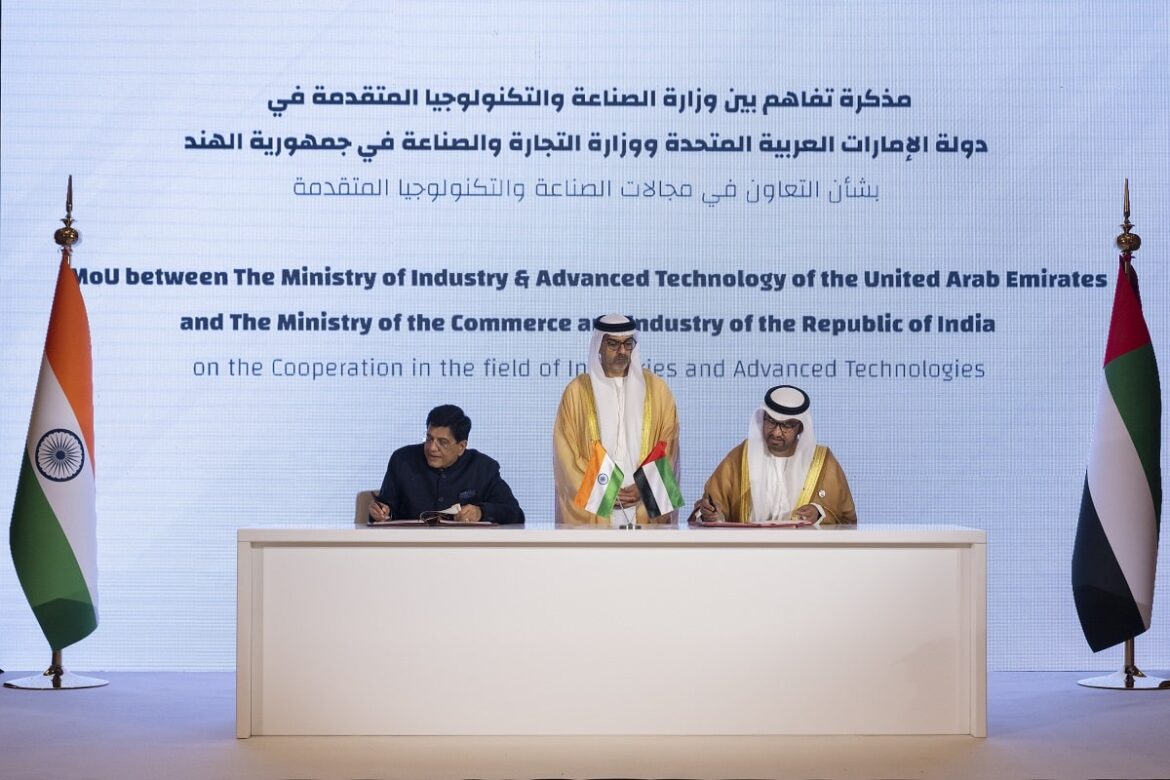235
UAE and India on Tuesday signed various Memorandums of Understanding (MoUs) that laid down frameworks for the expansion of bilateral investment cooperation in the renewable energy, food processing and health sectors.
The MoUs signed by the respective ministries, seek to cement relations between the countries underscoring the UAE’s strong commitment to supporting the continued development of India’s prospering economy, which is estimated to grow by 7.3 per cent during the current fiscal year.
The three MoUs are between the Ministry of Investment of the UAE and:
The Ministry of New and Renewable Energy of the Republic of India on investment cooperation in the renewable energy sector; The Ministry of Food Processing Industries of the Republic of India on investment cooperation in food park development; The Ministry of Health and Family Welfare of the Republic of India on investment cooperation in innovative healthcare projects.
On renewable energy, the countries aim to achieve net-zero emissions by 2070 and meet 50 per cent of its electricity requirements from renewable energy sources by 2030. As a result, there are plans to increase India’s renewable energy capacity to 500 gigawatts, reduce the emissions intensity of its economy by 45 per cent and reduce one billion tons of carbon dioxide. The Indian government estimates that the country’s shift onto a low-carbon path will require more than $10 trillion of new investments by 2070.
The MoU between the UAE and India focuses on forging effective collaboration by building relationships between public and private organisations while the agreement additionally proposes the implementation of incentives to support pertinent initiatives and aims to facilitate the exchange of knowledge.
The agreement for investment cooperation in food park development was signed by His Excellency Mohamed Hassan Alsuwaidi, Minister of Investment of the UAE; and His Excellency Pashupati Kumar Paras, Minister of Food Processing Industries of India. Under the agreement, the parties are committed to developing food park projects and driving other initiatives in the food processing sector that contribute to global food security. The investment cooperation aims to harness cutting-edge agritech, clean tech, and renewable energy solutions, symbolizing a significant partnership between the UAE and India.
The MoU centres on establishing robust and efficient collaboration through the development of bilateral relationships between public and private organizations. The agreement also proposes introducing incentives to bolster relevant initiatives and seeks to facilitate the exchange of knowledge. The MoU on investment cooperation in innovative healthcare projects was signed by Alsuwaidi and Dr. Mansukh Mandaviya, Minister of Health and Family Welfare of India. The MoU lays special emphasis on precision health, i.e., personalised healthcare based on a person’s unique genetic, genomic, or biological composition to help achieve well-being and optimal health. The development of a genomic centre of excellence is being evaluated as one of the possible projects under the MoU.
The healthcare sector in India is estimated to be around $372 billion. Factors such as affordable treatment, advanced technology, a wide range of specialties as well as access to international markets have accelerated the growth of this industry. The agreement for investment cooperation in food park development was signed by His Excellency Mohamed Hassan Alsuwaidi, Minister of Investment of the UAE; and His Excellency Pashupati Kumar Paras, Minister of Food Processing Industries of India.
Under the agreement, the parties are committed to developing food park projects and driving other initiatives in the food processing sector that contribute to global food security. The investment cooperation aims to harness cutting-edge agritech, clean tech, and renewable energy solutions, symbolizing a significant partnership between the UAE and India.
India’s food processing sector is one of the largest in the world, developing at an average annual growth rate of 8.3 per cent in the past five years. The output of the sector is expected to reach $535 billion by 2025/2026. The industry is expected to play a vital role in the overall growth of the country’s economy.
By Desmond Nleya , Daily Times


